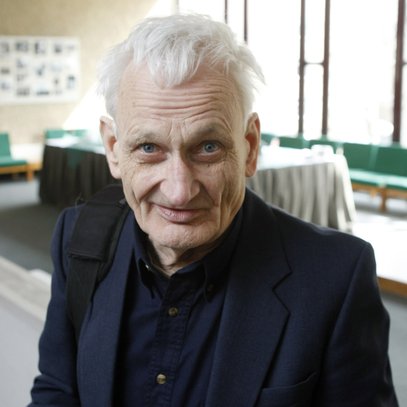Algimantas Bražinskas
Algimantas Bražinskas (b. 1937) composed in various genres: songs for solo voices and choir, vocal cycles, oratorios, cantatas, operas, chamber and symphonic music, music for children. His musical idiom is full of emotionality, dynamic development and expressive melodic lines. In his vocal music, special emphasis is placed on semantic links between music and text, independent, often contrasting lines of vocal part(s) and instrumental accompaniment join to form a consistent contrapuntal combination. Another important area of composer's work is choral music, consisting of several large-scale choral cycles. Set to the poems by Vytautas Bložė, Seven Ballads is one of Bražinskas' most popular choral cycles in which the narrative line unwinds through a coherent succession of varied vocal expression. For quite a long time Bražinskas has also arranged and written music for various folk ensembles. Here the composer extensively drew on most characteristic vocabulary of the folk music and shows a penchant for colourful instrumentation.
Our Holy Days
So I Will Bow to the Earth and the Sky
So I Will Bow to the Earth and the Sky
Biography
Algimantas Bražinskas (b. 1937) began to play the violin, accordion and piano, as well as to compose music at the Secondary Music School in Druskininkai. He continued his musical training at the Juozas Tallat-Kelpša High School of Music (present Vilnius Conservatory) in Vilnius in 1953-56, and at the Lithuanian State Conservatory (present Lithuanian Academy of Music and Theatre) where he studied composition with Prof. Eduardas Balsys in 1956-61. While still in his student years, he has made a name for himself by composing his first musical, Chatterers of Pagramantis, which was put on at the Kaunas Music Theatre in 1976.
His distinctions as a composer include several prizes at the local (such as Stasys Šimkus Competition, Jonas Švedas Competition and others) and all-union competitions. Among them are the Komsomol Prize for the Chamber Symphony (1970) and the State Prize for Seven Ballads (1973). He is the recipient of honorary titles, such as the Artist of Merit of the Republic of Lithuania (1975), and the People's Artist of the Republic of Lithuania (1987).
Bražinskas' major output consists of various classical genres: songs for solo voices and choir, vocal cycles, oratorios, cantatas, operas, chamber and symphonic music, music for children. After experimenting with aleatory and unconventional sound effects in his early works, the composer has later turned to more traditional means of musical expression and oriented himself towards wider audiences. His musical idiom is informed with emotionality, dynamic development and expressively tuneful melodic lines. In his vocal music, special emphasis is placed on semantic links between music and text by either rendering verbal expession in music (Songs of the Homeless), or reconstructing verbal 'intonemes' out of musical motives (Four Laments and Sacrifice). The accompanying parts often serve to illustrate certain themes (Lament to a Ladybird) or to convey emotional characteristics of certain situations (Lament at the Perished Son's Grave). Independent, often contrasting lines of vocal part(s) and instrumental accompaniment nevertheless join to form a consistent contrapuntal combination.
Another important area of composer's work is choral music, consisting of several large-scale choral cycles, such as Hoopoe's Ballads, Spring Games, concerto for choir The Land of My Summers, and Two Poems for Women's Choir. Set to the poems by Vytautas Bložė, Seven Ballads is one of Bražinskas' most popular choral cycles in which the narrative line unwinds through a coherent succession of different means of vocal expression - superimposing groups of contrasting voices, whispering, laughter, and the like.
For quite a long time Bražinskas has also arranged and written music for various folk ensembles. In latter pieces, the composer extensively drew on most characteristic vocabulary of the folk music and shows a penchant for colourful instrumentation.
Filter works by
Work title/Composer/Instrumentation | Samples | Resources | ||
|---|---|---|---|---|
Year/ |
No./Work title/Composer | Publication |
|---|
No./Work title/Composer | Publication |
|---|



